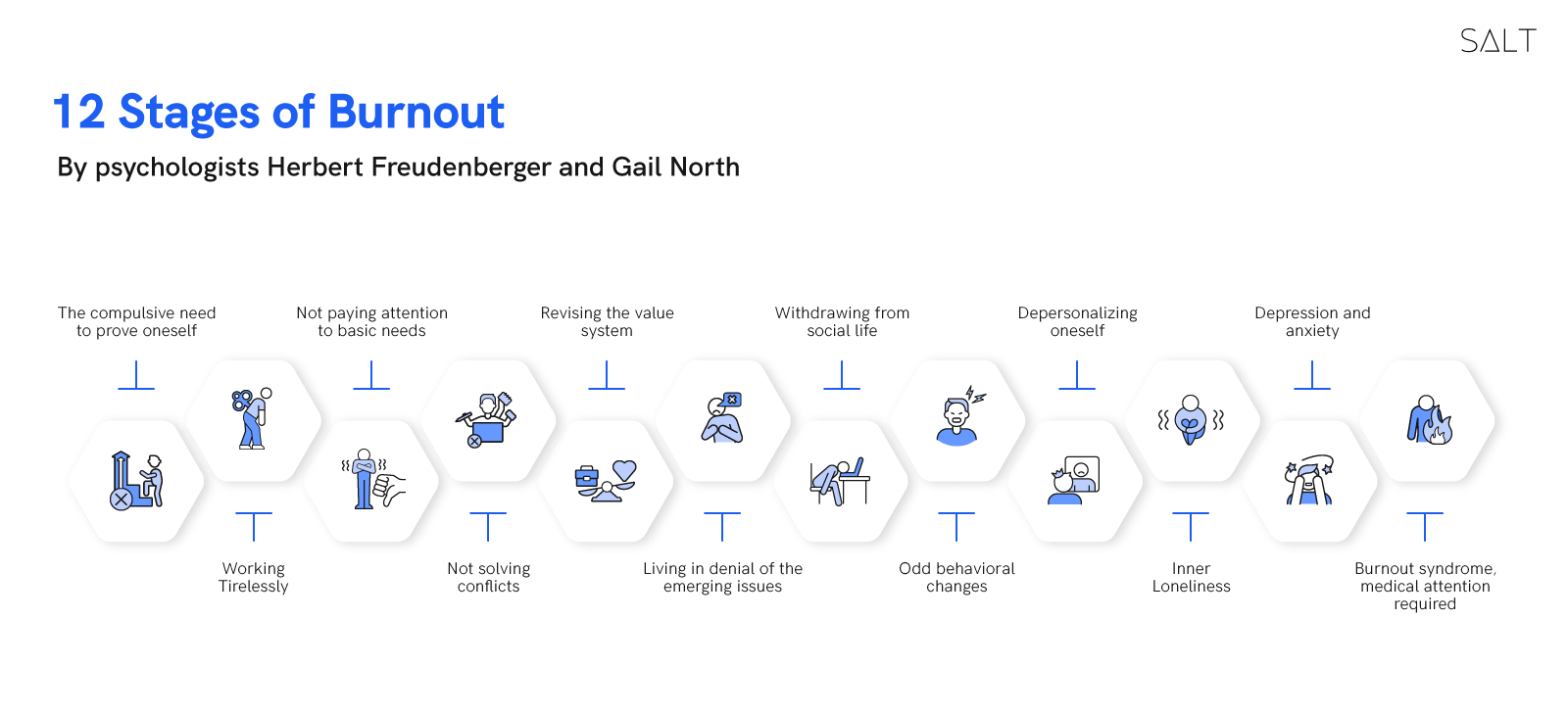“You can think of a startup as a way to compress your whole working life into a few years.”
~ Paul Graham, cofounder, Y Combinator
Facing stress at work is probably a daily cycle for an early-stage founder. But what about the burnout that these founders, especially first-time founders, face? Founder burnout is a very less-talked-about issue, but an increasingly common challenge founders of early-stage startups face. Burnout is very different from everyday stress and, if not diagnosed and handled correctly, can completely derail the founder and the startup.

Every founder, whether a first-time founder or a seasoned one, has gone through episodes of a lull when their oomph seems to have died down. There could be innumerable reasons for this loss of passion. It may be that the growth curve of the startup has stagnated, the solicited response from customers isn’t very favorable, or the team is facing a conflict of ideas. It could even be a positive reason for a probable burnout phase. For instance, a founder saw her passion waning when her business reached where she wanted it to be. Another founder felt their business was headed in a new direction, but the direction didn’t align with their core strengths.
Pete Daffern, a seasoned three-time CEO, says, "Most CEOs go into these sale processes without a full set of cards and with incredibly delusional expectations. This helps set the stage for crushing disappointment, from which some never fully recover."
In medical terms, burnout may be described as a psychological condition or a state of chronic stress leading to physical and emotional exhaustion, cynicism and detachment, and feelings of lack of accomplishment. Burnout, as a concept, was developed by Christina Maslach, Professor of Social Psychology at UC Berkeley.
What does it feel like to be burnt out?
Psychologists Herbert Freudenberger and Gail North developed a 12-stage model visualizing the progression of a burnout phase.

1. The compulsive need to prove oneself— Obsessed with demonstrating self-worth
2. Working tirelessly — finding oneself incapable of switching off
3. Not paying attention to basic needs — lack of sleep, lack of healthy eating, and lack of social interaction.
4. Not solving conflicts — problems are often dismissed.
5. Revising the value system — values become skewed, friends and family are dismissed, and hobbies become irrelevant.
6. Living in denial of the emerging issues— intolerance, cynicism, and aggression; perceiving collaborators as stupid; problems are viewed as caused by work.
7. Withdrawing from social life— social life small or nonexistent, hard social contacts.
8. Odd behavioral changes — changes in behavior obvious to friends and family.
9. Depersonalizing oneself — seeing neither self nor others as valuable.
10. Inner loneliness — feeling empty inside.
11. Depression and anxiety — feeling lost, exhausted, and pessimist about the future.
12. Burnout syndrome — mental and physical collapses; medical attention required
Founders relate their burnout experiences very vividly and had a lot to learn and work upon from these experiences. Joel Gascoigne, Buffer co-founder and CEO, says, “I had nothing left. This is how I’d describe my experience of burnout: I lost motivation. I just didn’t care. I knew I cared deeply, but I had nothing left. I couldn’t get up in the morning. I felt very sensitive and emotional. It was like anything could set me off and make me well up. I cried a lot, by myself and with people close to me.”
Rebecca Taylor, the founder of Aquarate, related her burnout experience, saying, “I started experiencing migraines and insomnia. I just assumed it was just something that comes from being a founder. When I reflect on it, I was definitely burned out. I felt depressed and completely exhausted. Everything I thought about my business was cynical, and all the passion I once had was gone.”
Mark O’ Hara, the founder of Thrift, compares his burnout experience to a mental treacle. He says, “In a short space of time, I went from having clear thoughts and lots of energy, to what felt like my whole body and thought process were in a thick haze. I felt empty, devoid of any motivation, and mentally and physically exhausted. I thought it was just a ‘tired phase’ I was going through. That it would simply sort itself out on its own - as if it were a cold. The only person that knew something wasn't right was my wife, Claire.”
How to avoid burnout?
Don't go for temporary fixes. Re-evaluate
Stop. Get down from the hamster wheel and sit still for a bit. Get back to the basics and re-evaluate what your strengths and passions are. And, of course, what you love doing. Now pull out a list of activities you are used to doing at your early-stage startup. Stop doing the things or at least reduce the things that interest you less and outsource them. Even if your business is going on successfully, there are times when you want to give up for the exhilarating efforts and strengths you need to put up as a first-time founder drain you too often.
Reconnect to what drives you
Undertake a personal value assessment to ensure you haven’t entirely discharged your personal and professional superpowers. Take a break, and escape from the work-life. Go on a retreat. Connect with friends, mentors, professionals, or even hobbies that help can help you sail through your burnout phase.
Prevent burnout in the future
To prevent burnout, founders must have a perspective and rest now and then to rejuvenate. For that, create a habit of disconnecting from work and taking a true vacation once a year. Practice a hobby and pick those things in which you can progress and feel fulfilled from achievements that are beyond work. Seeking the professional help of a therapist or a coach could be another way to upholster your mental fabric. Such relationships should be already established during the course of regular work.
Burnouts can happen to anyone at any stage of their startup journey. What is essential is that the signs are recognized and diagnosed at the right time. Your startup would need you at every stage in its lifecycle, so cool down yourself and prevent losing your zeal, prevent burnout!


